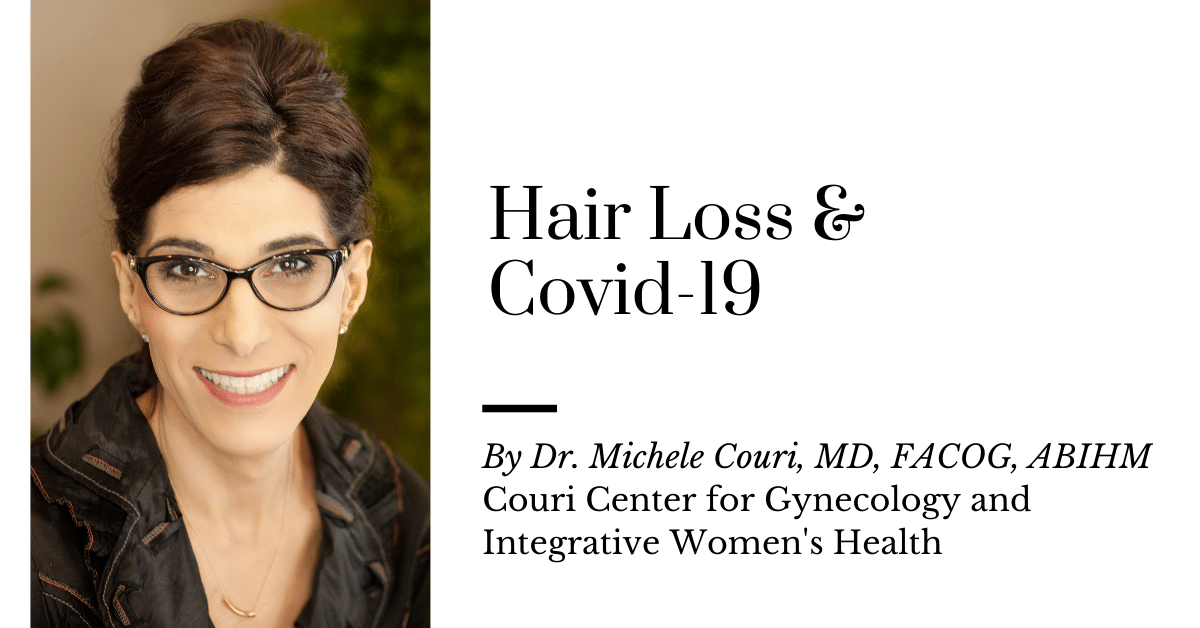
Hair loss can be traumatic and is a very sensitive topic for both women and men. So much of how we identify with ourselves relates to our hair. After losing all my hair to chemotherapy last year, I have never been so grateful for the hair that I now have and will never complain about a “bad hair day” again. Since returning to work last month, I have had several patients tell me about the hair loss they experienced after COVID-19 and asked me for recommendations. After three patients in one day related similar scenarios — they noticed significant hair loss 2-3 months after having had COVID-19, I decided to research the medical literature, see what has been reported, and develop protocols for individualized testing and treatment.
The hair loss associated with COVID-19 is a type of hair loss called telogen effluvium (TE) TE is a nonscarring, diffuse, hair loss from the scalp that occurs around 3 months after a triggering event and is usually self-limiting, lasting about 6 months. Triggering events for TE can be related to febrile illnesses, significant stress – both physical and psychological, surgery, extreme weight loss, medication side effects, hormone imbalances, and nutritional deficiencies. Because COVID-19 is a hyper-inflammatory state, the damage to the hair follicle from pro-inflammatory cytokines and their metabolites has been postulated as a potential trigger for COVID-19 related hair loss. Another hypothesis how COVID-19 infection causes hair loss is occlusion of the microcirculation of the hair follicle by very small thrombi or clots, thereby causing damage to the hair follicle with resultant hair loss. Lastly, direct infection of the hair follicle by SARS-CoV-2 has also been implicated in the development of COVID-19 related hair loss.
In an October 2021 study in the journal Dermatologic Therapy, researchers found that the prevalence of COVID-19 associated hair loss was present in 27.9% of cases and was significantly higher in women than men (42.3% compared to 6.2%). The hair loss related to COVID-19 developed on average 53.76 days after the diagnosis of COVID-19 and was slightly more common in hospitalized patients than those who remained as outpatients.
COVID-19 related hair loss usually resolves on its own but may last up to 6-9 months. Ensuring proper nutrition during this time is essential, and checking certain blood tests can help us identify conditions that may make the hair loss worse — certain vitamin deficiencies, thyroid, and other hormonal imbalances, and low iron levels are just a few of the things that we look at. At the Couri Center, we pride ourselves on providing individualized care for every one of our patients, and we have a multi-disciplinary team of professionals who can help you feel and look your best. In addition, based on current scientific research, we have supplement recommendations that address optimal hair health. We understand how stressful COVID-19 related hair loss may be and are here to help.
To Your Health,
Dr. Couri
Resources Cited:
J Clin Diagn Res. 2015 Sep; 9(9): WE01–WE03
Dermatologic Therapy. 2021;e15175.
Cleveland Clinic Jul. 30, 2020 / Dermatology & Plastic Surgery / News & Insights
